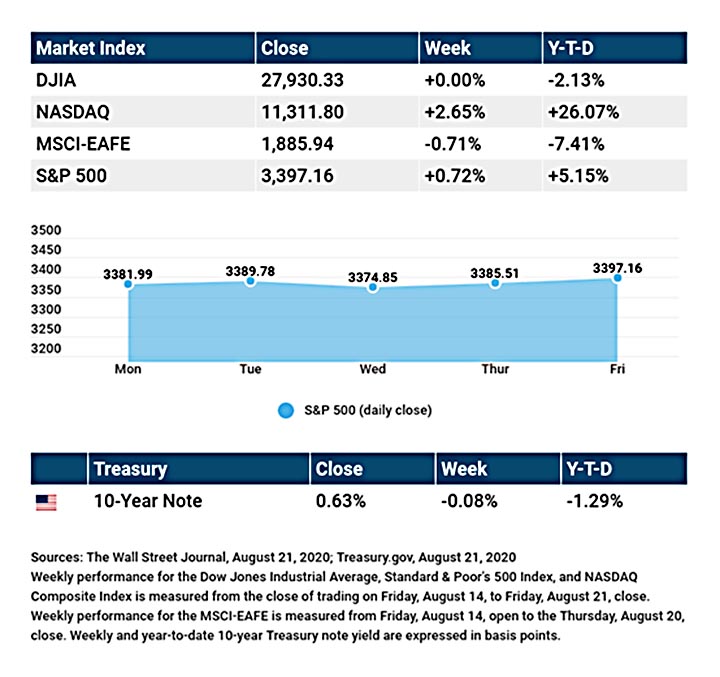
A note from Cokie — The week began with a rally on Wall Street and it seems that it will not be derailed even if there were another spike in coronavirus cases this fall, Wharton School professor Jeremy Siegel said in an interview on Tuesday.
So, for now any correction will not be as serious as we saw last March. “A little pause if we get a wave, but I don’t think it’s going to really stop the longer-term momentum upward,” said Siegel.
The S&P 500 hit an all-time high and closed above 3,400 for the first time. This means that the benchmark is higher at 55% above Covid-19 epic low on March 23.
Remember stocks are always forward-looking. Much of their value comes from earnings that are about 12 months into the future. This is why you can have a “U” shaped economy, or a “W” economy, and still have a “V” shaped stock market. Best advice: stick to your plan or if you do want to adjust, talk with your advisor before making any major changes—short of long term.
I’m available for consultations, message me or schedule time when we can talk for 15-minutes free!
This Week on Wall Street Stocks powered to another week of gains as the S&P 500 and Nasdaq Composite set multiple new record highs along the way. The Dow Jones Industrial Average was essentially unchanged while the Standard & Poor’s 500 rose by 0.72%.
The Nasdaq Composite index added 2.65% for the week. The MSCI EAFE index, which tracks developed overseas stock markets, slipped 0.71%.[1][2][3]The S&P 500 Sets Record High The S&P 500 closed at a record high on Tuesday, erasing the steep losses suffered in February and March. The recovery has been powered by unprecedented monetary accommodation, fiscal stimulus, and investor willingness to look ahead with confidence that global economies will get past the pandemic challenge. Technology stocks continued to lead the market and helped push the NASDAQ Composite to new highs.[4]
Stocks were mixed as the week progressed amid some weak economic news, a message of economic caution from the Fed, and continuing uncertainty over a new fiscal stimulus plan.Technology momentum provided support for the broader market, with a late Friday afternoon rally pushing the S&P 500 and Nasdaq Composite to close out the week at fresh record highs.[5]
Not All Sectors Are Participating
Behind last Tuesday’s headline that the S&P 500 had set a new record high lies a story of a deeply bifurcated market.
Despite a new high, more than half the companies in the index were still trading below where they began the year. When dissected on an industry sector basis, the year-to-date performance dispersion was quite wide, with sectors like Technology (+25.53%), Consumer Discretionary (+16.68%), and Communication Services (+12.70%) posting strong performance, while Energy (-37.56%) and Financials (-20.08%) remained sharply down. In fact, nearly half (5 out of 11) of S&P 500 sectors were still in negative territory year-to-date.[6][7][8]
THIS WEEK: KEY ECONOMIC DATA
Tuesday: Consumer Confidence. New Home Sales.
Wednesday: Durable Goods Orders.
Thursday: Jobless Claims. Gross Domestic Product (GDP).
Friday: Consumer Sentiment.
Source: Econoday, August 21, 2020
The Econoday economic calendar lists upcoming U.S. economic data releases (including key economic indicators), Federal Reserve policy meetings, and speaking engagements of Federal Reserve officials. The content is developed from sources believed to be providing accurate information. The forecasts or forward-looking statements are based on assumptions and may not materialize. The forecasts also are subject to revision.
THIS WEEK: COMPANIES REPORTING EARNINGS
Tuesday: Salesforce.com (CRM), Best Buy (BBY), Intuit (INTU)
Thursday: Marvell Technology (MRVL), Dollar General (DG), Dollar Tree (DLTR), Dell Technologies (DELL), VMware (VMW)
Source: Zacks, August 21, 2020
Companies mentioned are for informational purposes only. It should not be considered a solicitation for the purchase or sale of the securities. Investing involves risks, and investment decisions should be based on your own goals, time horizon, and tolerance for risk. The return and principal value of investments will fluctuate as market conditions change. When sold, investments may be worth more or less than their original cost. Companies may reschedule when they report earnings without notice.

| [1] The Wall Street Journal, August 21, 2020 [2] The Wall Street Journal, August 21, 2020 [3] The Wall Street Journal, August 21, 2020 [4] The Wall Street Journal, August 18, 2020 [5] CNBC, August 19, 2020 [6] BBC News, August 18, 2020 [7] FactSet.com, August 21, 2020 [8] FactSet.com, August 21, 2020 |